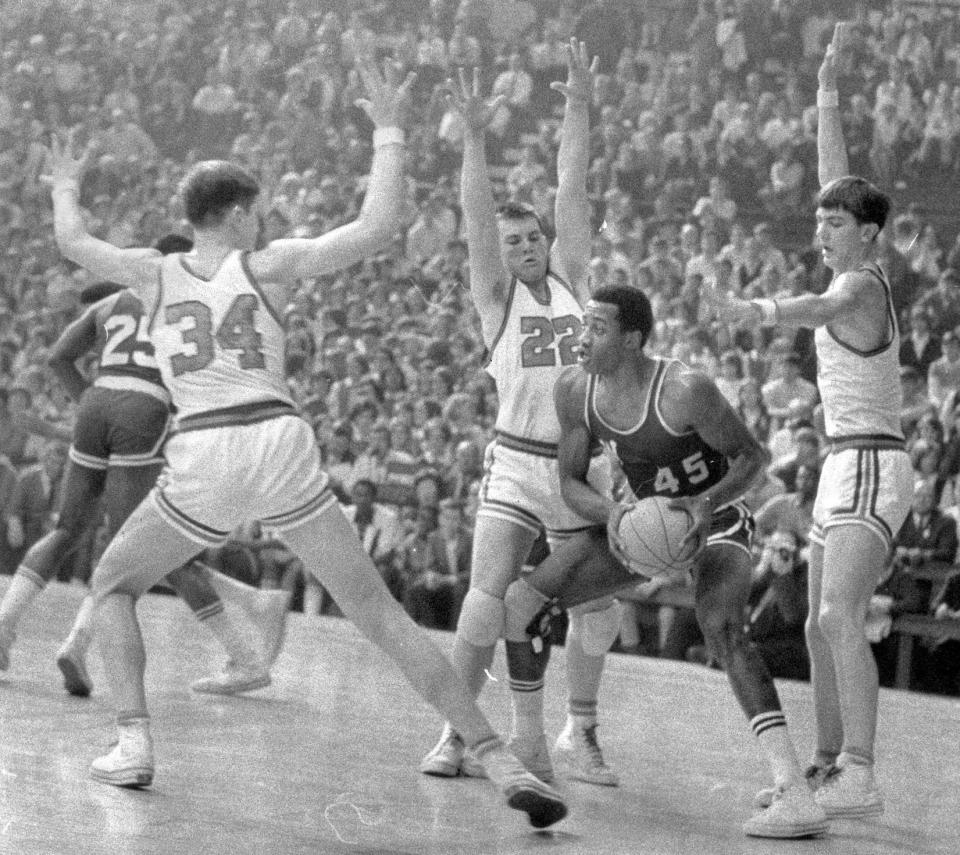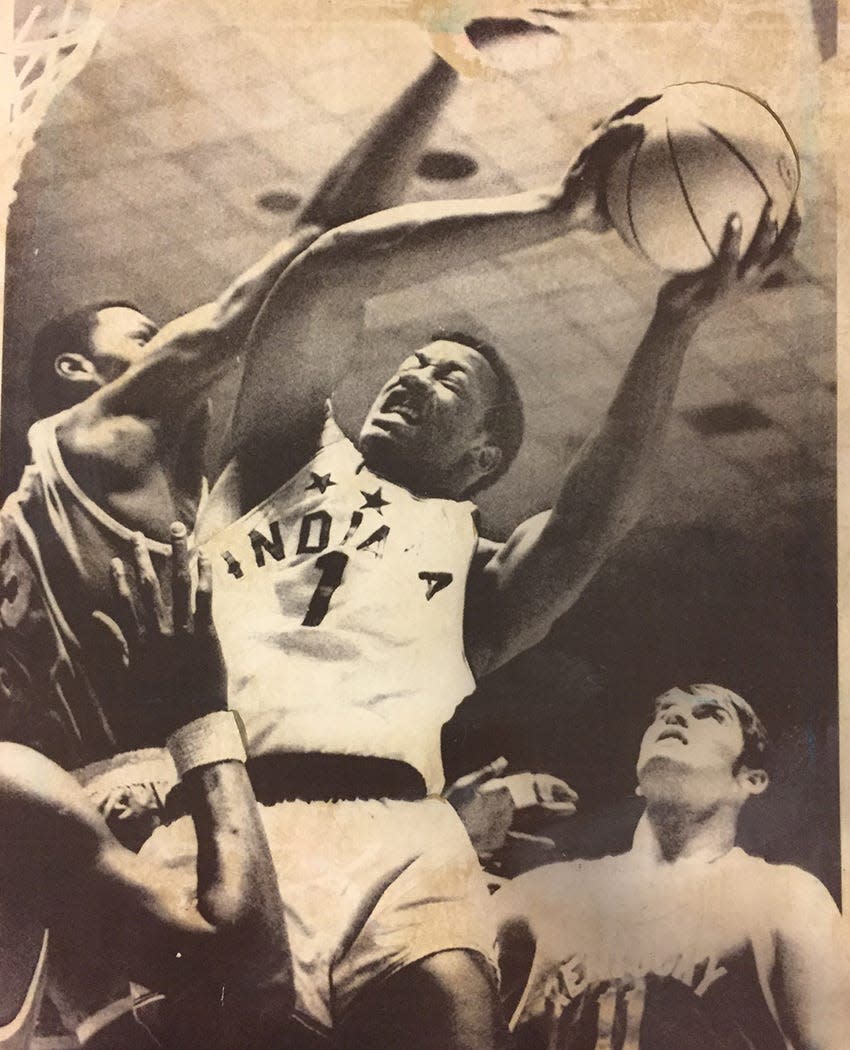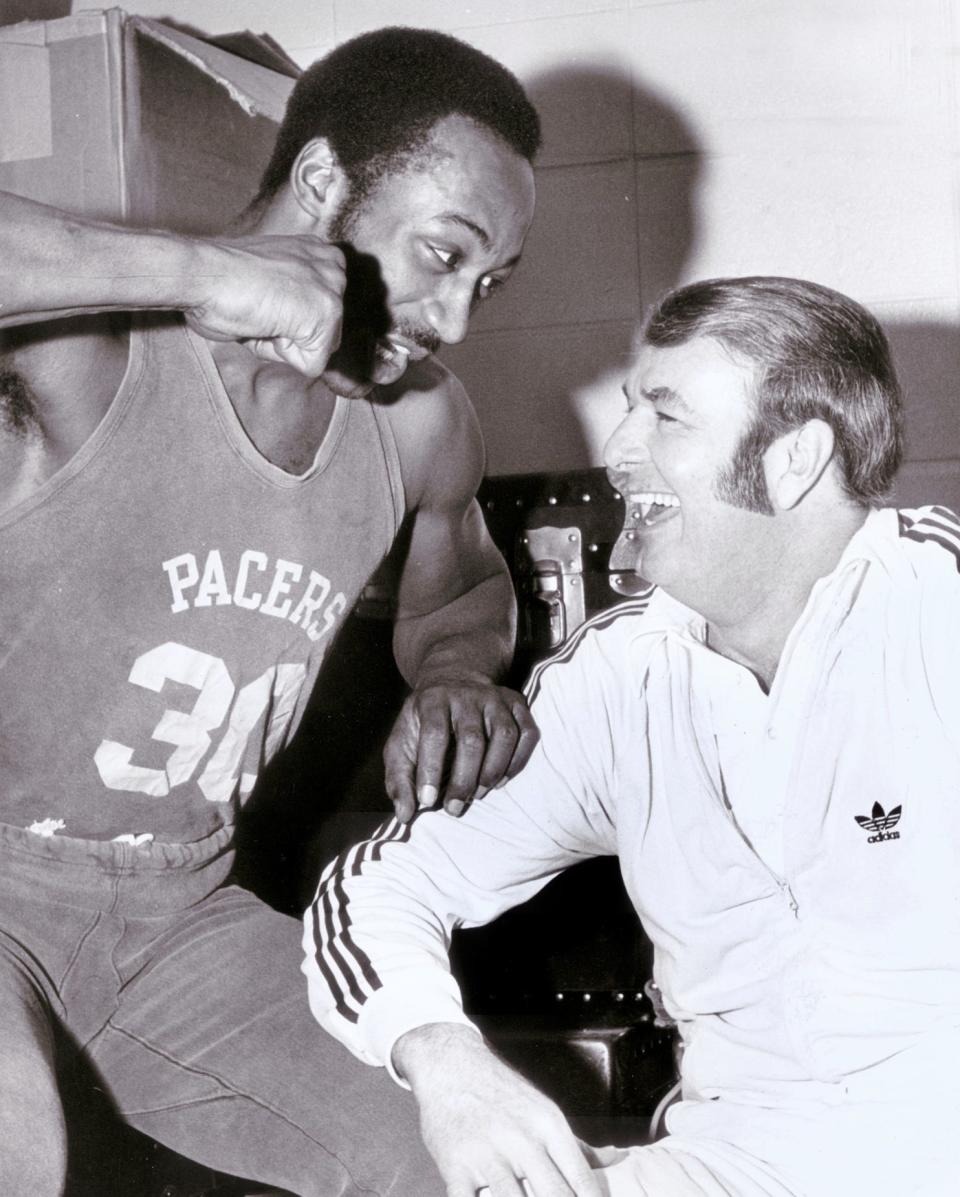Indiana basketball legend George McGinnis dies at 73: 'He was like Superman'
INDIANAPOLIS -- George McGinnis, the Washington High School basketball superstar who went on to become an Indiana University standout, then a modern-day precursor to today's massive NBA power forward while winning two American Basketball Association titles with the Pacers, died early Thursday morning. He was 73.
McGinnis' died due to complications from a cardiac arrest suffered last week at his home, according to the Pacers. He was taken to Community North Hospital with family, friends and former teammates keeping vigil until he died.
McGinnis was known as one of the strongest, most fierce competitors of his era.
"He was built like Superman," former NBA teammate Julius Erving said in 2017 when McGinnis was inducted into the Naismith Basketball Hall of Fame. "Until LeBron (James) came along, you never saw another guy that had George's physical abilities on a basketball court."
Among his on-court nicknames were "Superman," "Big Mac," "Big George” and “McGinnis the Magnificent.”
George Gervin said he was "a locomotive, big fierce, fast, strong." Said Slick Leonard: "I've seen everything that's come down the pike in 60-plus years. We're sitting here talking about one of the greatest power forwards that ever played the game."
McGinnis led his high school team to an undefeated season and a state championship. In his one season at Indiana, he was the first sophomore to lead the Big Ten in scoring and rebounding. With the Pacers, he won back-to-back ABA titles.
"When factoring high school, college and professional on totality, he is the most physically dominant player in Indiana history," said Jake Query, host of sports radio show "Query & Co." on 93.5/107.5 The Fan.
"And he is the second best professional from an Indianapolis high school. He was as physically gifted and ahead of his time in 1970 as LeBron James was in 2010."
We are deeply saddened to announce the passing of Hall of Famer George McGinnis.
"[George] was the very definition of an Indiana basketball legend, a champion, and Hall of Fame athlete. But he was more than that. George was family."https://t.co/EKs4rs4Ljb pic.twitter.com/UDPSl1fgm9— Indiana Pacers (@Pacers) December 14, 2023
Off the court, McGinnis was a humble, grateful player who never took for granted the sacrifice his parents made in the 1950s when they moved the family from Harpersville, Alabama, to Indiana.
The move Burnie and Willie McGinnis made to a state they knew nothing about was all about trying to give their son and daughter, Bonnie, the opportunities they never had. Burnie was a 6-7 sharecropper who joined more than 5 million Black people in the Great Migration to escape the south in search of better lives.
"That turned out to be one of the best things that ever happened to me," McGinnis said at his Hall of Fame induction in 2017. "Because it's hard growing up in Indiana and not falling in love with the game of basketball."
'We all wanted to be like the Big O'
McGinnis' basketball story began in 1956 as he sat in front of an old black-and-white television set inside his family's humble Indianapolis living room. McGinnis was 6 years old when he saw the nation's first all-Black basketball team win its second consecutive Indiana high school state championship at Crispus Attucks.
That game changed McGinnis' life forever.
"That night, I was introduced to a young man who became not only my hero but every kid in our community's hero," McGinnis said in 2017. His name was Oscar Robertson. "I can't tell you the pride we felt in our community."
The next day, after that state title game, it was a Sunday which meant no school. McGinnis, along with just about every other boy in the neighborhood were outside playing basketball. "We were all shooting buckets," McGinnis said in 2017. "We all wanted to be like the Big O."

Thirteen years later, McGinnis became a lot like the Big O. He followed in Robertson's footsteps, leading his Washington High to become the second team in Indianapolis high school history to go undefeated, 31-0, and win a state championship in 1969.
McGinnis averaged 37 points over the last four games of the tournament and was named Indiana Mr. Basketball that season.
He was the first Indiana high school player to surpass 1,000 points in a season, ending his career with 2,075 points and 1,638 rebounds, breaking the Indiana state records set by Robertson. As McGinnis excelled in basketball, he did too in football.
At 6-8 and more than 230 pounds, McGinnis was also a Washington High football star, a physical force that made his teenage teammates and opponents look like school boys.
McGinnis was a Parade magazine high school All-American in both football and basketball. He could have played either sport in college but committed to Indiana University on a full scholarship for basketball.
But before heading off to college, McGinnis played his final high school ball in the Indiana-Kentucky All-Star matchup, which featured two games. In the first game, McGinnis scored 23 points and grabbed 14 rebounds.
"I didn't think that was too bad but one of the Kentucky players was not very impressed with the game I had or me, so I didn't want to leave a bad impression on him," McGinnis said at his hall of fame induction. "So, the next week I had 53 points and 30 rebounds."

McGinnis' life seemed pretty blessed. On the way home from that game, he rode back to Indy with his parents. His dad, Burnie, didn't get to make it to many of his son's games. He worked construction during the day and at a factory at night.
"But that night, he told me how proud he was of me, one of the few times he ever told me that. And that was one of the best feelings I ever had," McGinnis said in 2017. "But tragically, nine days later he was killed in a construction accident. That All-Star game was the last game he ever saw me play so maybe it was God's will that I had the game that I did."
'Man, that was hard'
It was a hot summer day that July 7 of 1969. McGinnis' mom was out of town, so Burnie got he and his sister up and cooked them breakfast before heading off to work.
“About 10:30 a.m., the phone rings and this guy is saying your father’s been in a horrible accident," McGinnis told IndyStar in 2017. "Me and my sister jumped in this raggedy car my dad had bought me and raced over to the site."
When they arrived at the scene, the ambulance was already driving Burnie away. He had been standing on scaffolding beginning his job at an Eli Lilly & Co. building when the scaffolding collapsed. Burnie fell more than 60 feet to the ground.
"I heard this one guy say, ‘Man, there’s no way that guy can live,'" McGinnis told IndyStar. "We get to the hospital and a doctor comes out and says, ‘I don’t think your dad’s going to make it. It won’t be more than a few minutes.’ That’s when it really hit me. He was only 43 years old, young and strong. Man, that was hard.”
Burnie died at General Hospital 90 minutes after the fall.
From that moment, McGinnis said he was playing for family -- for his mother, Willie, and his sister, Bonnie.
At Indiana, McGinnis was an All-American and became the first sophomore in Big Ten history to lead the league in scoring and rebounding, averaging 29.9 points . Freshman were not eligible to play varsity at the time.
"I enjoyed my time there, but our family was struggling financially, my mother," McGinnis said at his Hall of Fame speech. In April 1973, he left the university and signed with the ABA's Indiana Pacers.
McGinnis said he took his entire $15,000 signing bonus and put it toward a down payment to buy his mother a house.
'He was sensational'
With the Pacers, McGinnis led the team to back-to-back ABA championships in his first two seasons and was MVP of the ABA playoffs in 1973. He was an All-Star in three of his four seasons in the ABA and MVP of the league in 1975.
"He could post up, he could break you down one-on-one, he could make the three ball. Add to it a great passer," Hubie Brown, who was inducted into the hall of fame in 2005, said in 2017 as McGinnis was inducted. "He was sensational."
McGinnis was known for his signature shot, the one-handed jumper.
"Coaches have told me that my shot was the worst-looking they’d ever seen,” McGinnis told IndyStar in 2017. “But I just felt comfortable shooting that way. I didn’t feel good with my left hand touching the ball. I would touch it going up, but before I shot it, I had to let it go. It was not a thing of beauty, that’s for darn sure. But I made it work.”
Pacers coach Leonard once said: "It wasn't the prettiest thing you've ever seen, but it sure went in the basket a lot."

"He was the best player on the Pacer team," Gervin said. "There (is) no question. George was the focal point. What he could do with that basketball was special."
McGinnis played 11 seasons of professional ball, moving to the NBA with the Philadelphia 76ers, then Denver Nuggets before returning to the Pacers for his final two seasons ending his career in 1982.
McGinnis is one of four Pacers players to have his jersey (No. 30) retired by the team, alongside Roger Brown, Reggie Miller and Mel Daniels.
Follow IndyStar sports reporter Dana Benbow on X: @DanaBenbow. Reach her via email: dbenbow@indystar.com.
This article originally appeared on Indianapolis Star: George McGinnis: Indiana basketball legend, Pacers champion dies at 73

 Yahoo Sports
Yahoo Sports 
